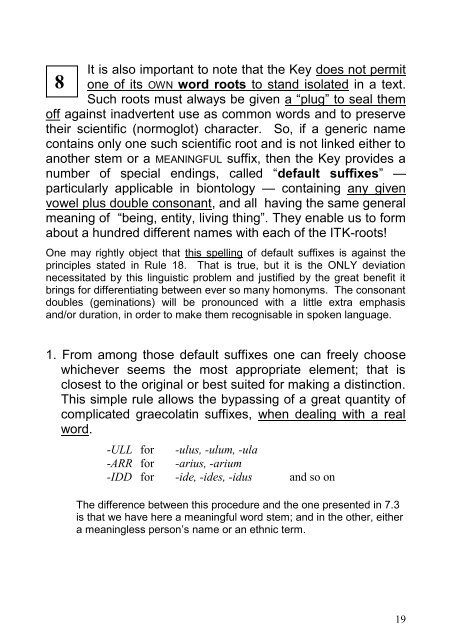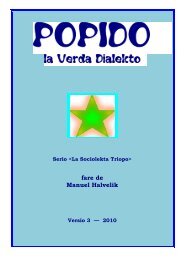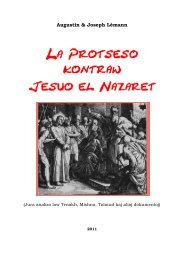the TRIMERAL SYSTEM in BIOLOGICAL TAXONOMY - universala ...
the TRIMERAL SYSTEM in BIOLOGICAL TAXONOMY - universala ...
the TRIMERAL SYSTEM in BIOLOGICAL TAXONOMY - universala ...
Create successful ePaper yourself
Turn your PDF publications into a flip-book with our unique Google optimized e-Paper software.
It is also important to note that <strong>the</strong> Key does not permit<br />
8<br />
one of its OWN word roots to stand isolated <strong>in</strong> a text.<br />
Such roots must always be given a “plug” to seal <strong>the</strong>m<br />
off aga<strong>in</strong>st <strong>in</strong>advertent use as common words and to preserve<br />
<strong>the</strong>ir scientific (normoglot) character. So, if a generic name<br />
conta<strong>in</strong>s only one such scientific root and is not l<strong>in</strong>ked ei<strong>the</strong>r to<br />
ano<strong>the</strong>r stem or a MEANINGFUL suffix, <strong>the</strong>n <strong>the</strong> Key provides a<br />
number of special end<strong>in</strong>gs, called “default suffixes” —<br />
particularly applicable <strong>in</strong> biontology — conta<strong>in</strong><strong>in</strong>g any given<br />
vowel plus double consonant, and all hav<strong>in</strong>g <strong>the</strong> same general<br />
mean<strong>in</strong>g of “be<strong>in</strong>g, entity, liv<strong>in</strong>g th<strong>in</strong>g”. They enable us to form<br />
about a hundred different names with each of <strong>the</strong> ITK-roots!<br />
One may rightly object that this spell<strong>in</strong>g of default suffixes is aga<strong>in</strong>st <strong>the</strong><br />
pr<strong>in</strong>ciples stated <strong>in</strong> Rule 18. That is true, but it is <strong>the</strong> ONLY deviation<br />
necessitated by this l<strong>in</strong>guistic problem and justified by <strong>the</strong> great benefit it<br />
br<strong>in</strong>gs for differentiat<strong>in</strong>g between ever so many homonyms. The consonant<br />
doubles (gem<strong>in</strong>ations) will be pronounced with a little extra emphasis<br />
and/or duration, <strong>in</strong> order to make <strong>the</strong>m recognisable <strong>in</strong> spoken language.<br />
1. From among those default suffixes one can freely choose<br />
whichever seems <strong>the</strong> most appropriate element; that is<br />
closest to <strong>the</strong> orig<strong>in</strong>al or best suited for mak<strong>in</strong>g a dist<strong>in</strong>ction.<br />
This simple rule allows <strong>the</strong> bypass<strong>in</strong>g of a great quantity of<br />
complicated graecolat<strong>in</strong> suffixes, when deal<strong>in</strong>g with a real<br />
word.<br />
-ULL for -ulus, -ulum, -ula<br />
-ARR for -arius, -arium<br />
-IDD for -ide, -ides, -idus and so on<br />
The difference between this procedure and <strong>the</strong> one presented <strong>in</strong> 7.3<br />
is that we have here a mean<strong>in</strong>gful word stem; and <strong>in</strong> <strong>the</strong> o<strong>the</strong>r, ei<strong>the</strong>r<br />
a mean<strong>in</strong>gless person’s name or an ethnic term.<br />
19






